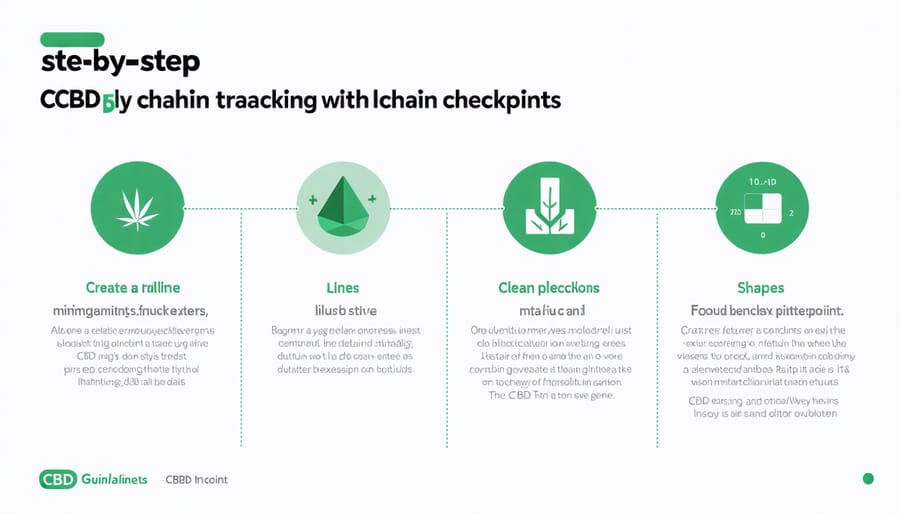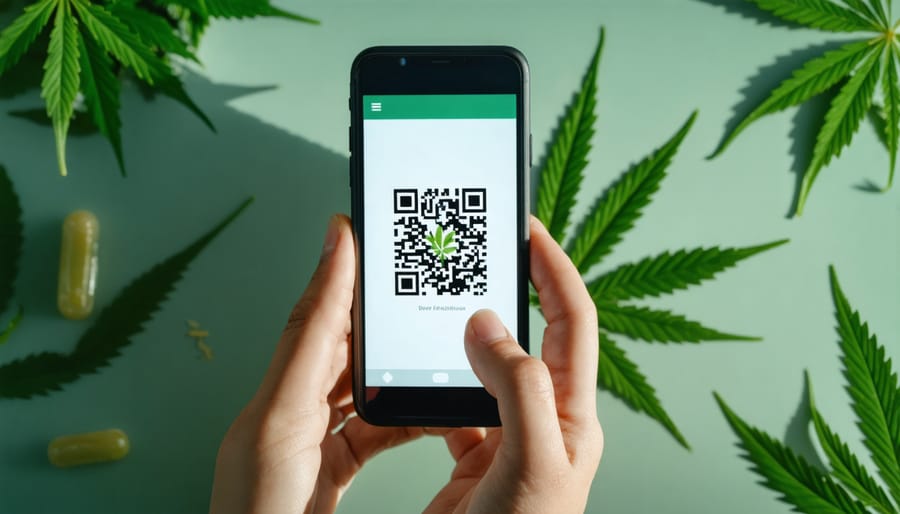Blockchain technology is revolutionizing how we verify and secure CBD for sleep products and other wellness supplements. As counterfeit CBD products flood the market, emerging blockchain technology offers a groundbreaking solution to ensure authenticity and traceability. By creating an immutable digital ledger of CBD oil production, testing, and distribution, blockchain provides unprecedented security and transparency for manufacturers and consumers alike. This technology enables real-time tracking of CBD products from seed to shelf, verifying lab results, organic certifications, and handling procedures at every step. For businesses and consumers concerned about product authenticity, blockchain integration represents a quantum leap forward in CBD supply chain security, offering tamper-proof documentation and instant verification capabilities that traditional systems simply cannot match.
Why CBD Oil Needs Blockchain Security
Current Supply Chain Vulnerabilities
The CBD oil industry currently faces several challenges in its supply chain tracking systems. Paper-based records are easily lost or tampered with, making it difficult to verify product authenticity. Many companies still rely on basic spreadsheets and manual data entry, which often leads to errors and inconsistencies in tracking information.
Quality control is another major concern. Without reliable tracking, it’s hard to verify if CBD products contain the advertised amount of CBD or if they’re free from contaminants. Some manufacturers might cut corners by using low-quality hemp or unsafe extraction methods, and traditional systems make it challenging to catch these issues.
Product recalls are also problematic. When safety concerns arise, companies struggle to quickly identify and track affected batches. This delay can put consumers at risk and damage brand reputation. Additionally, counterfeit CBD products frequently enter the market, and current systems offer limited tools to distinguish genuine products from fake ones.
The Cost of Compromised Data
When CBD supply chain data gets compromised, the consequences can be serious and far-reaching. Companies have faced hefty fines, some reaching up to $100,000, for mishandling customer information or failing to track product sources accurately. Beyond financial losses, data breaches can expose sensitive details about farming practices, processing methods, and customer purchasing patterns.
Take the 2021 incident where a major CBD retailer’s database was hacked, exposing over 30,000 customer records and their complete purchase histories. This breach not only damaged the company’s reputation but also raised concerns about medical privacy, as many customers use CBD for health conditions.
For small businesses, even a minor data breach can be devastating. One Colorado-based CBD startup lost 40% of its customer base after hackers tampered with their supply chain records, making it impossible to verify product authenticity. These real-world examples show why secure, blockchain-based solutions are becoming essential in the CBD industry.

How Blockchain Secures CBD Data
Immutable Record Keeping
Think of blockchain’s record-keeping system like a digital notebook where every entry is written in permanent ink. Once information about CBD oil production, testing, or shipping is recorded, it can’t be erased or changed. This feature is crucial for maintaining the integrity of CBD product data.
Each time new information is added – whether it’s test results, batch numbers, or shipping details – it creates a new “block” of data. This block is connected to all previous records, forming a chain of information that tells the complete story of each CBD product from seed to shelf.
What makes this system particularly powerful is that copies of these records are stored across many different computers in the network. If someone tries to tamper with the information on one computer, the other copies will immediately show that something’s wrong. It’s like having thousands of witnesses all keeping an eye on the same information.
For CBD companies and consumers, this means having access to reliable, trustworthy information about their products. You can trace a bottle of CBD oil back through its entire journey – from the farm where the hemp was grown, through processing and testing, right up to the moment it reaches the store shelf. This level of transparency helps build trust and ensures product authenticity.
Smart Contracts for Verification
Smart contracts act as digital security guards for CBD oil verification, automatically checking and recording every step of the product’s journey. Think of them as robot helpers that never get tired or make mistakes. When a CBD oil bottle moves from the manufacturer to the store, these smart contracts spring into action.
Here’s how they work: Each time the CBD oil changes hands, the smart contract checks if everything matches up – from batch numbers to test results. If something doesn’t look right, it raises a red flag immediately. It’s like having a super-reliable bouncer who checks every ID at the door, but for CBD products.
For example, when a laboratory tests a CBD batch, the results are automatically recorded in the blockchain through a smart contract. If someone later tries to tamper with these results or swap products, the smart contract will detect the mismatch and prevent the transaction.
These automated checks make it much harder for counterfeit products to slip through. They also save time – what used to take days of paperwork and phone calls now happens in seconds. Plus, since smart contracts can’t be bribed or fooled, they provide a level of trust that human verification alone can’t match.
For businesses and consumers, this means greater confidence in CBD products and fewer headaches about authenticity.
Real-World Implementation

Track-and-Trace Systems
In today’s CBD industry, blockchain-based track-and-trace systems are revolutionizing how companies monitor their products from seed to sale. These systems work like a digital diary, recording every step of a CBD oil’s journey through supply chain management systems.
Major CBD producers are using platforms like CannaTrace and MediLedger to create tamper-proof records. Here’s how it works: Each batch of CBD oil gets a unique digital identifier, similar to a fingerprint. Every time the product moves – from harvesting the hemp plants to processing the oil to shipping the final product – the system logs these details on the blockchain.
For example, when a farmer harvests hemp plants, they scan a QR code that triggers an entry in the blockchain. This entry includes details like harvest date, location, and batch number. As the hemp moves through processing, each facility adds new information, creating a complete history that can’t be altered.
These systems help prevent counterfeiting and ensure product quality. Consumers can scan product QR codes to view the complete history of their CBD oil, including test results and processing information. This transparency builds trust and helps companies prove their products are genuine and safe.
Consumer Verification Tools
For consumers wanting to verify their CBD oil’s authenticity, several user-friendly tools are now available through blockchain technology. The simplest method is scanning the QR code on your CBD product with your smartphone. This code connects you to a blockchain record showing the complete journey of your product, from farm to shelf.
Many CBD companies now offer dedicated mobile apps that make verification even easier. These apps can instantly tell you if your product is genuine by checking its unique identifier against the blockchain database. Some advanced remote verification systems even allow you to view detailed lab reports and farming practices right from your phone.
Here’s a quick checklist for verifying your CBD oil:
1. Locate the product’s QR code or numerical identifier
2. Use the manufacturer’s app or website to scan/input the code
3. Check that the displayed information matches your product
4. Review the batch number and production date
5. Verify the lab testing results
If any information doesn’t match or you can’t find your product in the system, it might be counterfeit. Remember to only purchase CBD products from manufacturers who provide these verification tools and maintain transparent blockchain records. This simple verification process helps ensure you’re getting a safe, legitimate product.

Future Security Developments
The future of CBD oil security through blockchain technology looks incredibly promising. Several exciting developments are on the horizon that will make product verification even more reliable and user-friendly.
Smart contracts are evolving to include automated quality control checkpoints. These will instantly flag any irregularities in the CBD production process, from farming to bottling, without human intervention. Think of it as having a digital quality inspector working 24/7.
Mobile apps are being developed that will let customers scan CBD products and instantly see their complete history on the blockchain. You’ll be able to verify your CBD oil’s authenticity as easily as checking your social media feed.
Another breakthrough coming soon is the integration of IoT (Internet of Things) sensors with blockchain systems. These tiny sensors will track environmental conditions during shipping and storage, ensuring your CBD oil maintains its quality from warehouse to shelf.
Artificial intelligence is also entering the picture, helping to predict potential security threats before they happen. These AI systems will analyze patterns in the blockchain data to spot attempted fraud or tampering early on.
Perhaps most exciting is the development of cross-chain verification systems. These will allow different blockchain networks to communicate, creating an even more secure and comprehensive tracking system for CBD products worldwide.
Blockchain technology is revolutionizing how we secure and track CBD oil products, offering a game-changing solution for both businesses and consumers. By creating an unbreakable chain of information from seed to sale, blockchain ensures that every bottle of CBD oil can be traced back to its source. This level of transparency helps prevent counterfeiting, ensures product quality, and builds consumer trust. The decentralized nature of blockchain means that no single party can tamper with the records, making it a reliable tool for maintaining CBD supply chain integrity. As the CBD industry continues to grow, blockchain adoption will become increasingly important for companies looking to prove their commitment to quality and authenticity. The future of CBD oil security lies in embracing this innovative technology to create a safer, more transparent marketplace for everyone.
